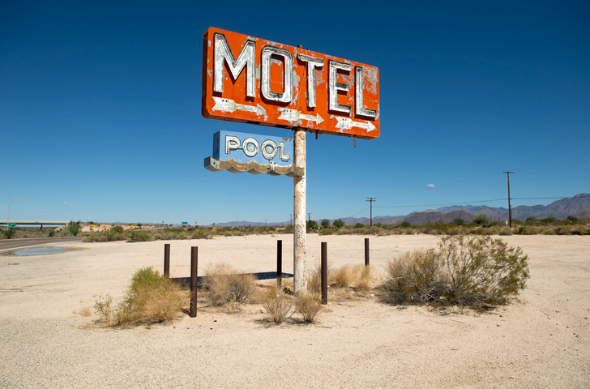Hotel or motel? Hotel vs motel. It’s a question and comparison that both guests and hoteliers ponder.
Just as guests need to make a decision about which type of accommodation suits their needs, hoteliers need to think carefully about the differences between motels and hotels and select the category their property falls into when marketing their small business.
Here, we look at the key differences between hotels and motels, what types of guests each appeal to and how to use this difference to market your property successfully.
What’s the difference between a hotel and a motel?
Hotels are typically larger properties offering a wide range of amenities, such as restaurants, room service, gyms and concierge services, with rooms accessed via internal corridors. Motels are usually smaller, more budget-friendly and designed for motorists, with rooms accessed directly from the car park. While hotels often cater to longer and/or more upscale stays, motels focus on convenience and short-term stopovers.
Nevertheless, a small, independent hotel might still be confused with a motel, so it’s important to understand the key differences between these categories of property. Let’s start with the definitions.
The definition of hotel tells us that it’s “a commercial establishment offering lodging to travellers and sometimes to permanent residents, and often having restaurants, meeting rooms, stores, etc., that are available to the general public.
The definition of motel, on the other hand, tells us that it is “a hotel providing travellers with lodging and free parking facilities, typically a roadside hotel having rooms adjacent to an outside parking area or an urban hotel offering parking within the building.”
This means motels – originally known as motorist hotels – are often located conveniently, rather than a more attractive locale. Motels will generally have only one or two floors while hotels may be high-rise.
Motels will also generally have less features and more limited food and beverage offerings. There’ll be fewer staff and a smaller number of specialised staff, and this generally translates to lower rates for guests.
Key differences at a glance:
- Access: Hotels have internal corridors; motels have external doors to parking
- Amenities: Hotels offer full services; motels focus on basics
- Target: Hotels suit longer stays; motels serve road travelers
- Price: Hotels typically cost more; motels emphasize affordability
Little Hotelier is for every small property
Whether you’re managing a hotel or a motel, Little Hotelier can help boost your bookings and simplify your operations.
Learn moreLeading examples of a small hotel and a motel
The QT Hotel in Newcastle, Australia, offers more than just lovely rooms and a range of amenities, promising “muted bronzes and rich ochre tones pay homage to Newcastle’s steel-city heritage, and an Italian-born, Michelin-starred chef whips local produce into haute cuisine wonders.”
Meanwhile, if you stay in Australia but head way down south into Victoria, the Yackandandah Central is a great example of a modern motel. It’s located in the centre of town and comes with a fully-stocked kitchenette. The hosts are listed by name on the website and every car is given a complimentary windscreen clean before getting back on the road – a lovely nod to the very essence of a motel.
Why do travellers choose either hotel or motel?
Travellers often choose hotels for their comfort, amenities and more upscale experience, particularly for multi-night stays. Motels appeal to those seeking affordability, convenience and quick and easy vehicle access for shorter stopovers.
Ultimately the differences between motels and hotels means they appeal to different types of guests.
Travellers who choose motels
Convenience and price are two important drivers for motel guests. Those who want to avoid the formality of staying at a hotel might also opt for motel accommodation, too.
Travellers who choose hotels
Small hotels generally offer a wider range of facilities and amenities, such as restaurants, room service and a swimming pool. Hotels therefore appeal to those who want to be a little more comfortable and pampered during their stay.
How do marketing strategies differ for hotels vs motels?
Hotels and motels should create marketing materials that speak to the unique needs and wants of their guests, then put those materials in places where those guests will see them, particularly online.
A motel might emphasise their convenient location and layout on their website. Meanwhile, a nearby hotel might be boasting about the relaxation benefits of a stopover that includes an on-site restaurant, gym and pool.
Of course, the unique features of your particular motel or hotel will also help determine your target audience and guide your marketing plans.
Whether you’re marketing a hotel or motel, success depends on having the right tools to reach your ideal guests efficiently. Modern property management systems can help both hotels and motels implement these differentiated marketing strategies while streamlining operations, ensuring you spend less time on administration and more time delivering the experiences your specific guests expect.
Frequently asked questions about hotels vs motels
How should I categorise my property on booking platorms if it has both hotel and motel features?
Choose the category that matches your primary target market and pricing strategy. If you offer limited services but premium amenities like a pool or restaurant, “hotel” positioning may justify higher rates. If convenience and value are your strengths, “motel” attracts road-trippers and budget travelers. Test different categorizations across platforms to see what drives better occupancy. When managing multiple channels from one system, you can easily track which positioning performs best on each platform.
Do hotels and motels have different insurance or licensing requirements?
Requirements vary by location, but generally depend on your services rather than your label. Properties serving food need health permits, those with pools need additional liability coverage, and properties over certain room counts may face different fire codes. Check with your local authority about specific requirements for your service mix. The real difference is operational. Hotels typically need more comprehensive coverage due to their expanded amenities and higher guest traffic areas.
Can I transition my motel to boutique hotel positioning without major renovations?
Yes, repositioning often involves strategic changes rather than complete overhauls. Focus on enhancing guest experience through better linens, local artwork, curated amenities, or themed rooms. Update your photography to highlight unique features and craft a compelling story about your property. Adjust your pricing gradually as you add value. Properties that centralize their online presence can quickly test new positioning across all channels while maintaining consistent brand messaging.
By Dean Elphick
Dean is the Senior Content Marketing Specialist of Little Hotelier, the all-in-one software solution purpose-built to make the lives of small accommodation providers easier. Dean has made writing and creating content his passion for the entirety of his professional life, which includes more than six years at Little Hotelier. Through content, Dean aims to provide education, inspiration, assistance, and, ultimately, value for small accommodation businesses looking to improve the way they run their operations (and live their life).
Table of contents
“When it comes to Little Hotelier's mobile app, it's all there. Coordinating rooms and rates across providers is straightforward and navigation is simple.”
Owner, Riverhouse in Maine








